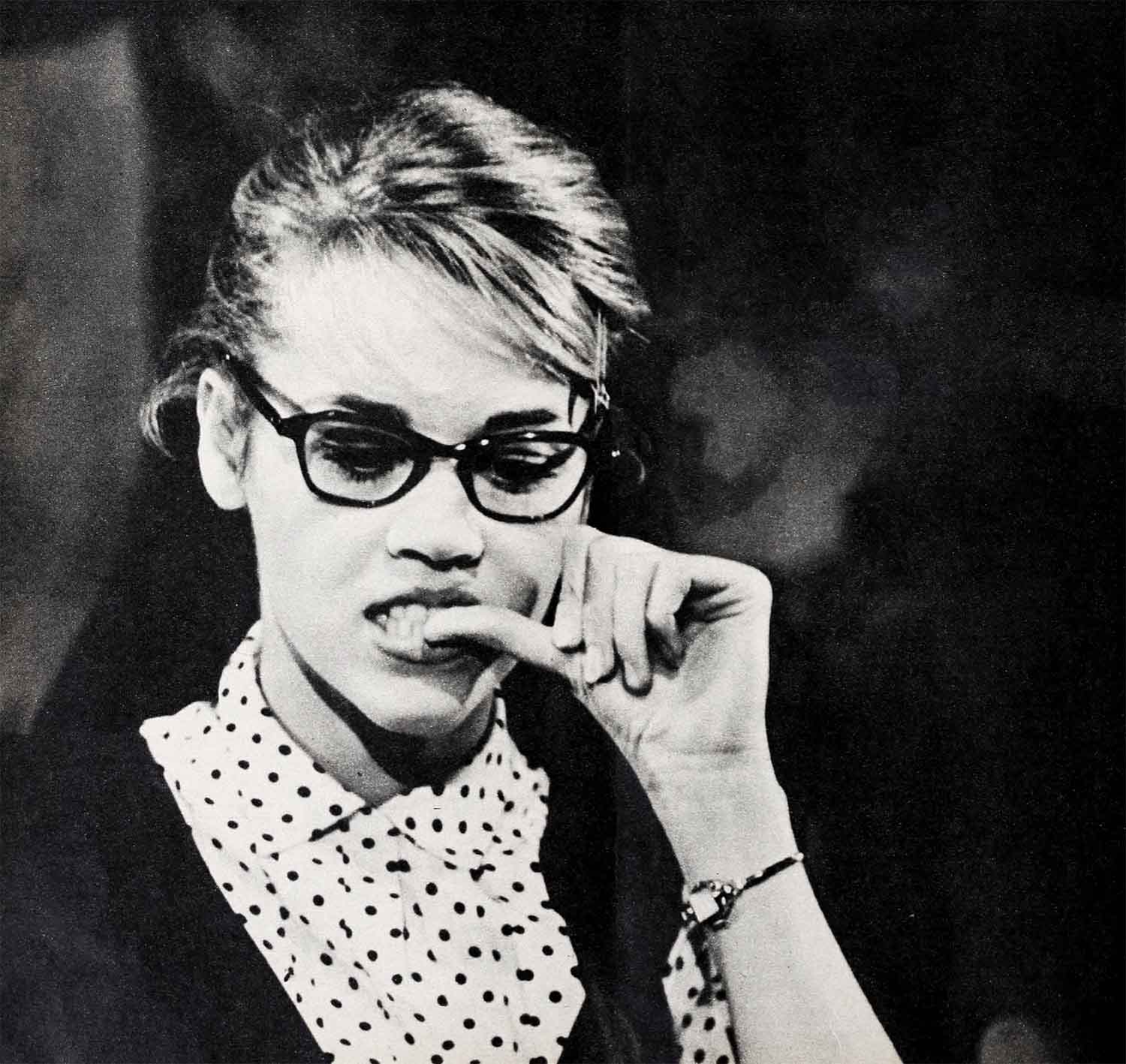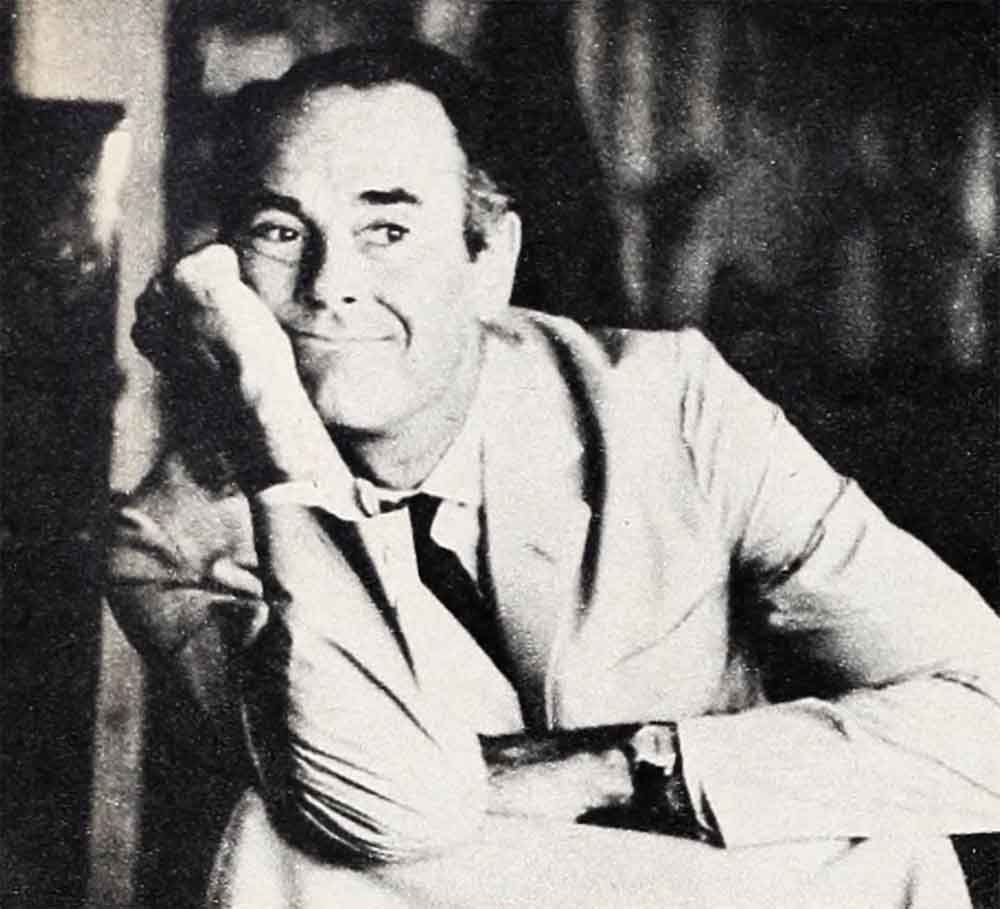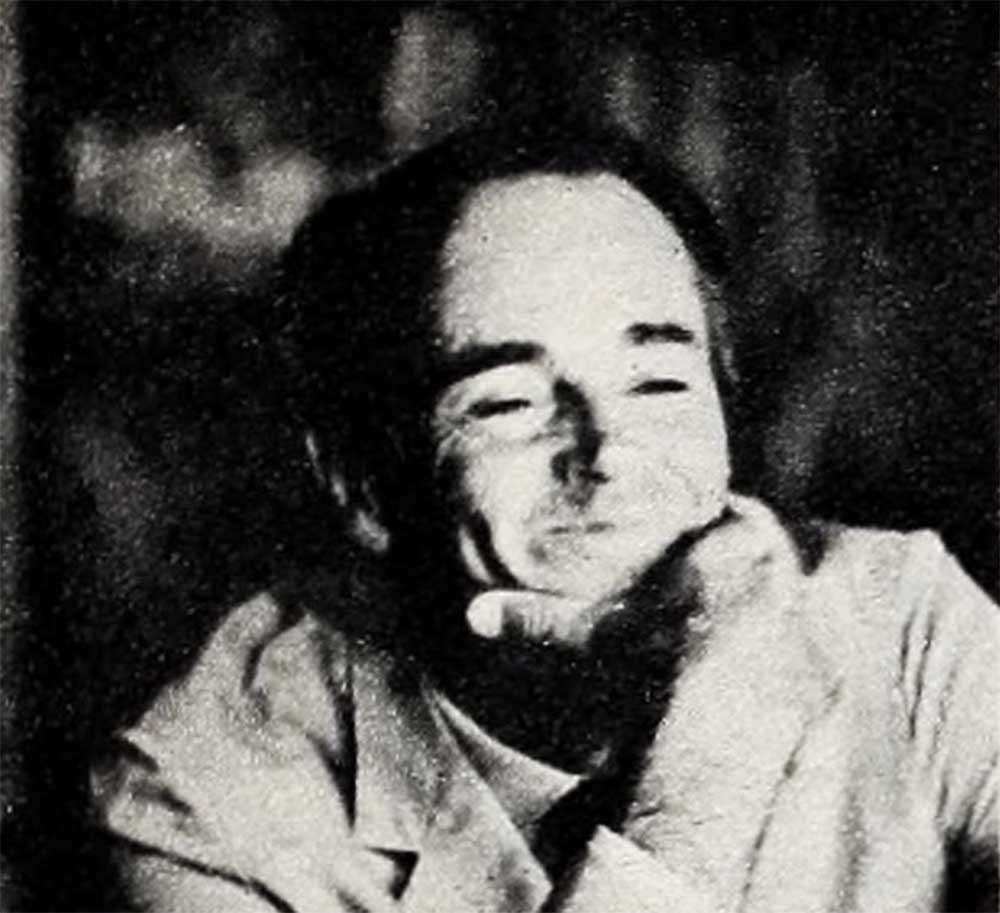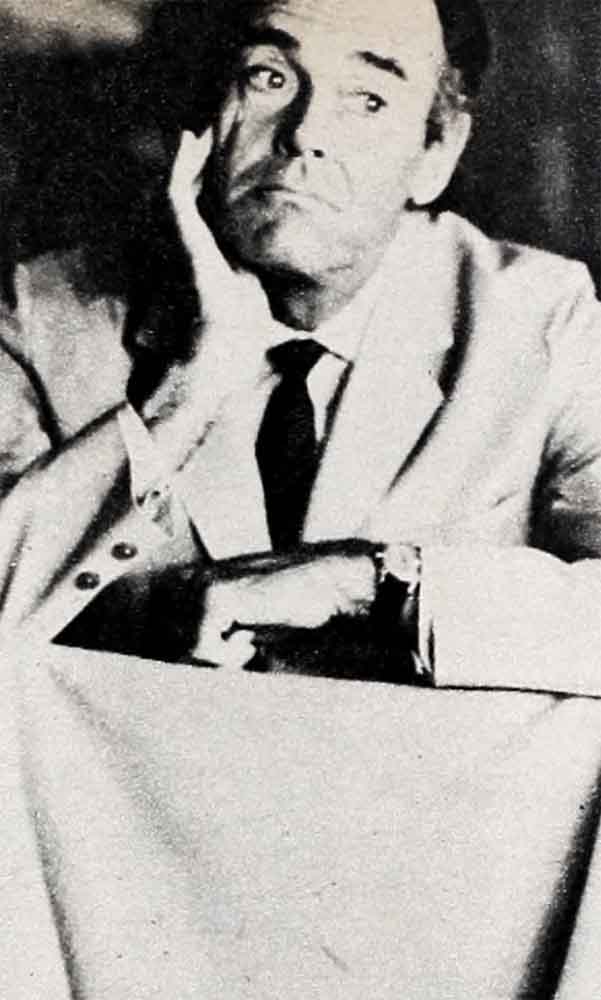Plain Jane Fonda
It’s awful to be nervous, and Jane Fonda says, “I’ve been nervous a lot in my life. Like the first time when I was real little and saw my dad in ‘Drums Along the Mohawk.’ I became so excited, I got sick.” She felt the same way when she played in her first piano recital when she was nine, and her father still kids her, today, about the first time she saw pictures of her mother in the hospital, holding her newborn brother in her arms. “I had hysterics,” says Jane, who was then only two. “And when I took my first Hollywood screen test, I had to be. practically carried in,” she adds. “I was quite sure everybody would say—what a plain Jane. . . .
AUDIO BOOK
“Of course,” she says, suddenly looking quite serious and moving her hands restlessly across the table, “I’m not nervous any more.” But those hands give her away. They’re seldom still. Almost as though she were conscious of this, she turns and straddles a straight back chair, folding her arms across the back of it and then rests her chin on one hand. Looking up, she adds, “But I . . . sometimes, have to tell myself to be calm. And sitting like this is the only way I can do it.”

In every other way, she’s very much like her famous father, Henry Fonda. They are similar in manner and speech and her nose and eyes stamp her as a Fonda immediately, “although the most frequent remark is that I have the Fonda chin!” She confesses she smokes, but not very much, loves music and always has the radio playing. “My favorite pop singers are Bobby Darin and Elvis Presley,” she confides and then laughs, suddenly adding, “Do you know I’ve been choosing my own clothes since I was old enough to go shopping? But I’m not really clothes conscious. I just like simple things and never wear hats.”
Steak s her favorite food, “but I don’t really eat it as often as I’d like. When I’m in a show I go home and make myself a sandwich—maybe whole-wheat toast with cottage cheese and tomato. But mostly I eat eggs and yogurt. It doesn’t sound very exciting but I was forced to get into the habit of eating non-fattening foods some years ago.” Modeling was the cause of this She took it up two years ago and was so afraid she was too fat, she began to diet. “I just had to be a success to earn enough to pay my share of the apartment,” she explains. She was living with a girlfriend, in New York, at the time. “But I hate modeling,” she says. “You need the patience of a saint.”


Yet modeling meant money in her pocket. “You see,’’ she explains, “Daddy had been supporting me in style tor years and now that I was practically twenty-two—and pretty spoiled—I decided to try to earn a dollar on my own.”
She promptly made a mint of them. After her first, six months as a model, she appeared simultaneously on the covers of four national magazines. “I guess I just happened to look different from the girls they’d been using,” she says modestly, then laughs and adds, “I remember the first time I passed a newsstand and saw fifty of my own eyes peering at me. It was pretty unnerving. I must have had my mouth wide open in surprise because a news-vendor asked if anything was wrong. I wasn’t quite sure whether I should buy one of each magazine or just walk on!
“I weigh only 109 pounds now,” she says proudly, “which isn’t much for someone who’s five feet, seven inches tall. But I still have to watch my weight,” she says seriously, “although I do get huge yens for huge sundaes.”
Jane doesn’t go out very often, or attend parties very frequently. She doesn’t like drinking, particularly, “but that’s not why I dislike cocktail parties,” she insists. “I guess I just don’t like to stand up and talk to people! Maybe I’m still a little nervous,” she admits shyly.
“I guess I was worse as a child,” she says thoughtfully. “I was always afraid, then, of meeting strange people and going out to parties. And the only person I would really have good times with was my brother Peter. I remember we had so much fun together. Like on rainy days when we would take out sheets and drape them over tables to make little houses to play in. And I remember, too how we went through a phase where we loved to throw rotten tomatoes at passing cars. We would hide behind trees and dart out just when the car went by. The driver would be furious . . . but not one ever caught us. We were sort of like two countrified juvenile delinquents. But mostly we loved to go exploring in the hills, hunting for secret caves, for trails and for Indian relics.”
Then she laughs again and says, “Even though I was shy, I guess I was quite a tomboy I loved to play cops and robbers, and Indians, and anything with animals.”
And she had the ideal surroundings because, right after she was born—a few days before Christmas in Doctor’s Hospital in New York—her father took her and her mother out to California to live on a farm. He was filming “Jezebel” at the time—this was in 1937—and for ten years they stayed on out West, in Brentwood, living on the farm which had “lots and lots of animals” as well as a pool and tennis courts.
“I remember,” she continues, “there was a playhouse on the grounds, large enough for someone to live in. In fact, someone did. Jimmy Stewart lived there for five years after the war. Almost like one of the family.

“We—Peter and I—loved him best at Christmas time because then he would dress up as Santa Claus—beard and all—and run across the roof dragging sleigh bells. Christmas was a fabulous time at our house; the happiest time of the year.
“We had a huge living room and it was always filled with millions of big funny presents. We weren’t allowed to open them until Christmas morning and we would play guessing games to decide what was inside. I would want to peek when no one was looking and Peter always teased me and complained I was impatient.
“Dad always loved the electric trains Peter used to get. He never got to play with them when Dad was around.
“Oh . . . we all loved Christmas. Me, especially, because it was a time spent with the family.” She pauses, for a moment, looks thoughtful and says, “I guess because I was so shy and nervous, I only had a few friends and these I played with all the time. I remember, I particularly hated going to parties where there were other stars’ children. I would feel out of place and uncomfortable and want to run home.” She opens her eyes wide and confides, “I felt so awkward and so plain and unglamorous compared with the others.”
Then, she tosses her head and suddenly answers a question often asked, “I never really knew I was the daughter of a famous star until I was quite a bit older. Dad never talked about his work. Oh, once in a while he’d grow a beard for a picture and go off on location. But that was all that was different about him.
“Then, when I grew up a little, my mother took me to see some of his pictures. Seeing your own dad on the screen seems strange, only because you identify with the character he’s playing, much more closely. I remember in ‘Fort Apache’ he played a bad man who got killed and it just broke my heart. I hated to see him play a bad man and I hated to see him kiss a woman on the screen.”
As a child, she says, she loved movies “far more than the theater.” This was because, “in the movies you can just sit in the dark and imagine all sorts of things.” And she found them easier to enjoy and to believe in.
“But I never really concerned myself with the theater until I was much older,” she says, “although, whenever I went to see my father backstage, I would think of what an exciting place a theater was and somehow I think I knew that’s where I would finally want to spend my life. It had a strange kind of atmosphere that I found fascinating.”
Her father never encouraged her into acting. “If anything, he was against it, although he never kept me from it. Actually,” she continues, “he was very strict with us all through our childhood. He never spoiled us or gave us anything we couldn’t handle. I remember, I always longed for a horse of my own but I never got one because I had a mule that I didn’t take care of.”
He took his duties as a father so seriously, says Jane, that “he even insisted we move when he thought we were picking up a false sense of values from our friends. He said he preferred the discomfort of moving to what he considered unhealthy friendships.”

When she was thirteen, tragedy hit her life. Her mother died. And even today, Jane will never talk about it.
It was after this that they moved back—she and her brother—to the East coast—to Connecticut, and then to New York. And around the same time, Jane took her first dancing lessons and became friendly with Brooks Hayward, Margaret Sullavan’s daughter. “We grew up only two blocks from one another,” she says. “Her mother was my father’s first wife.”
Dancing helped Jane get over some of her awkwardness and it lessened her nervousness. And when, as a teenager, Jane was sent to boarding school—the Emma Willard School in Troy, New York—she claims, “I was quite self-possessed and even got into trouble.
“I have a lot of energy,” she says with a toss of her dark-blond head. “I don’t conform easily. I’d smoke behind the piano, play records in the middle of the night, throw things in the dining room. They had a rule book as thick as the telephone directory and your punishment depended on the crime. You might be sent to bed early, or have to stay on campus for the weekend, things like that. Frankly, I think sometimes it’s the imaginative ones who get into trouble. Class presidents are usually very dull.
“I spent most of my time in my own little group. There were about seven of us. I don’t really know if I’m an extrovert or an introvert,” Jane says, raising her eyebrows at the psychological terms. “I think I fluctuate between the two, but probably verge more on introvert. I was lonely, sometimes. I think adolescents are always lonely. And shy people are some of the time. I think I’m a shy person, even now. If someone makes me feel uncomfortable, I don’t know how to cope with it. When I was little, I used to wish I had an Indian brother, or a companion who could walk and talk but who was not really real. Someone who would always be willing to do what I wanted to do.
“I was always shy with boys. I still am, but this is a subject I don’t discuss much. But I will say this. I like a man with ambition and drive. A man with intelligence, imagination and a sense of humor. He must be attractive, yes, but not necessarily handsome. There’s a kind of chemistry that makes someone attractive.” Then, changing her expression, she adds, “One thing I can’t tolerate in a man is weakness, stupidity and dullness.”
Although Jane was always thrilled by the theater—“I was always on the stage in school”—she decided against being an actress when she was about sixteen. I felt if I couldn’t be the greatest or the best, I should be nothing at all,” she explains. “And I was still worried about being too plain. So I toyed with the idea of being a veterinarian, then a scientist, then a psychiatrist. Then I wanted to work in a mental hospital. The thought of probing the human mind really fascinated me.”
Undecided, she went up to Vassar College for two years—“two restless years”—but still her problem remained unsolved. So, still seeking a vocation, she then went off to Paris to study painting. Once there, she attended three different academies and ended up “learning French and having a good time.” But she hasn’t touched a brush since she came horn, three years ago. “My father’s an excellent painter, though,” she says proudly. “Brilliant, in fact. I have one of his paintings—pansies in a vase. It’s lovely.”
It was right after her return from Paris, that she began modeling and sharing an apartment with a girlfriend instead of living with her father. But she soon tired of modeling.
Then, after a taste of summer stock with her father—a successful one—she came to the conclusion that she would never be happy anywhere but in show business. She decided to accept being at the bottom of the ladder and try to become the greatest—or as good as she can be.
“Have I ever considered changing my name?” she looks up, a puzzled expression on her pixie face. “No! I’m proud of it. I know how the kids of some famous parents feel. They want to prove they can do it on their own—it’s a form of pride. Personally, I’m willing to take advantage of it. I believe in pulling a few strings The name Fonda helps me and I’d be loathe to give it up! As a matter of fact, I think you work harder because there’s someone special you can’t let down.”
Jane works all the time. She studies dancing at June Taylor’s, and takes singing and speech lessons, as well as her classes with Lee Strasberg at Actors’ Studio.
“I have a purpose now”
“When I met Lee Strasberg,” says Jane, “he scared me so much, and fascinated me so much, I knew I had to study with him. He is a brilliant man and has marvelous classes. I began to study with him in the fall of ’58. After the first two weeks, my whole life changed and has never been the same since. I have a real purpose now, a real goal. Before that, I was just drifting on a sea of indecision.”
When she went to Hollywood to make her first movie, “Tall Story,” Jane continued to find out things about herself. “They were just little things,” she says, “but it all adds up. Like a makeup man who told me, one day, ‘Your eyes are your good feature. Play them up.’ And then, while making the picture, something happened that just did wonders for my ego. In one scene, I was supposed to wear a cheerleader’s costume with a very short skirt. I hesitated at first, because I’d never thought my legs were especially nice before. But I got whistles—honest!”
And has Hollywood, and the theater, changed her? “Well,” she says, sweeping a hand along her upswept hair and looking down, in mock sultriness, at the low- cut blouse her role called for, “I really don’t know. But I often wonder what Dad must think of me now.”
We think he’d probably say, “Look what’s happened to my plain Jane!”
—CHARLOTTE BARCLAY
SEE JANE FONDA IN WARNERS’ “TALL STORY.” HENRY FONDA CAN BE SEEN ON NBC-TV, SATURDAYS IN “THE DEPUTY” FROM 9-9:30 P.M., EDT.
It is a quote. PHOTOPLAY MAGAZINE AUGUST 1960
AUDIO BOOK




